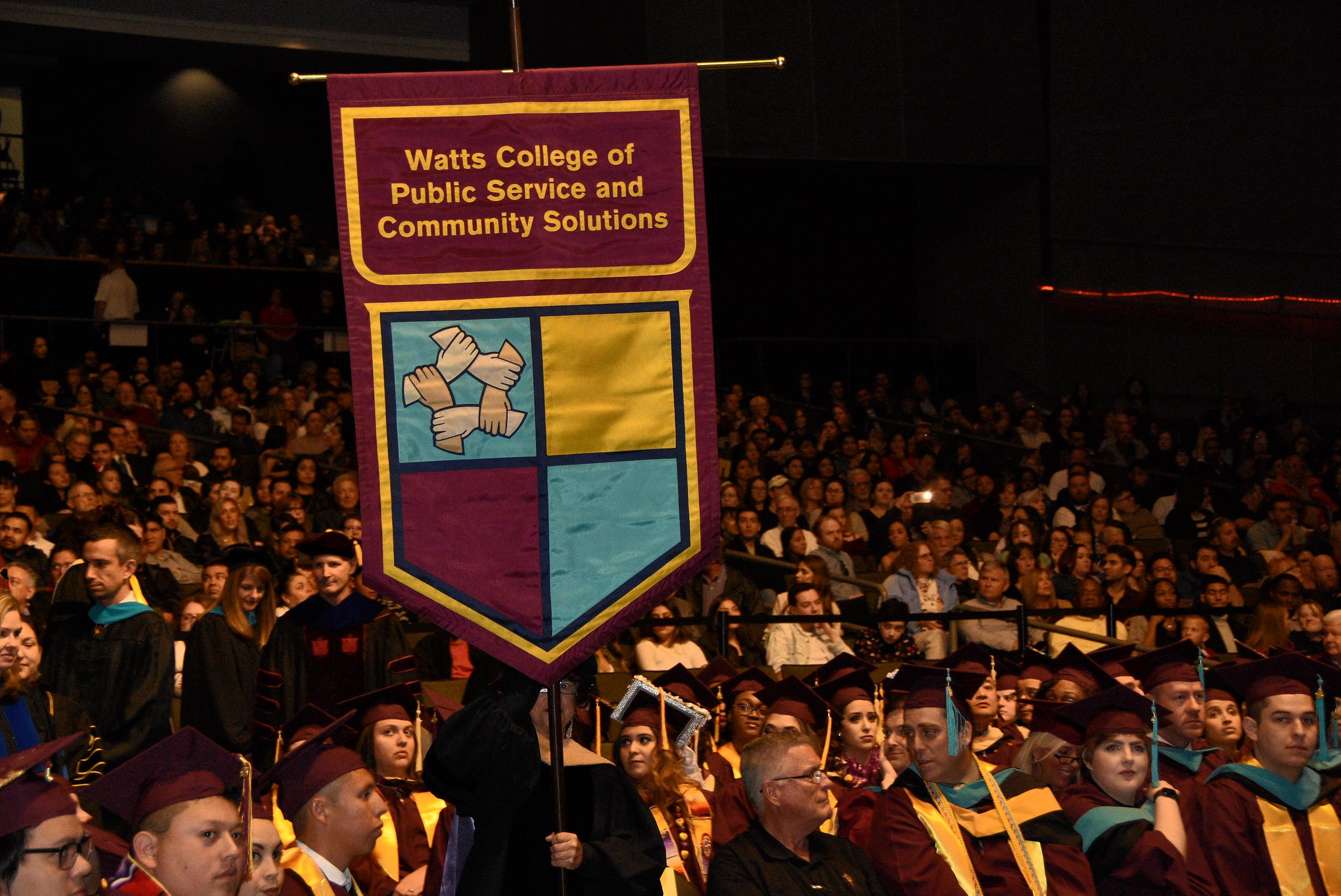
Watts College home to 7, top-10 graduate degree programs ranked by U.S. News & World Report
The Watts College of Public Service and Community Solutions, the nation’s largest comprehensive public service college, was recognized today with elite rankings for its schools of public affairs and criminology. With highly rated programs in each of its four schools, Watts College presents vivid evidence for the core claim of Arizona State University: excellence and inclusion go hand in hand. Indeed, half of the 14 ASU graduate-degree programs ranked in the top 10 are found in Watts College, ASU’s most diverse unit.
In the prestigious 2022 Best Graduate Schools rankings by U.S. News & World Report, which considers 282 eligible universities nationwide, the School of Criminology and Criminal Justice (SCCJ), was ranked as the No. 2 program in the United States. It held the No. 5 position in 2021. ASU’s programs in public administration and public policy, offered by the School of Public Affairs (SPA), was placed at No. 13 in the nation, tied with Columbia and the University of Chicago.
In addition, SPA was ranked in the top 10 in the U.S. in seven specialized fields of study, up from six in 2021. The only school in the country with more top 10 rankings (eight) than ASU was Indiana University, which was ranked No. 2 in the U.S.
ASU’s School of Social Work’s impressive No. 25 standing holds as U.S. News did not update those rankings for 2022. Watts’ program in nonprofit management was ranked No. 5 nationally but other programs in the School of Community Resources and Development -- tourism, parks and recreation, and community development -- are not ranked by the publication but have been rated as among the top in the world by international assessments focused on these disciplines.
“These rankings, which represent recognition by our peers, are strong evidence that Watts College is the best place to prepare for a successful career in public service,” said Watts College Dean Jonathan Koppell. “They also powerfully demonstrate that the university’s deep-seated beliefs in diversity and inclusion require no compromise of our pursuit of excellence in every field.”
The majority of Watts College undergraduates identify as first-generation college students with more than half of students coming from underrepresented populations. The college also leads the university in percentage of veterans students, Native students, returning students and more. “We take great pride in the ability of students from all backgrounds to achieve their potential in Watts College,” Koppell said. “These rankings speak to the quality of learning experience our highly respected and knowledgeable faculty offer to our amazing students.”
The School of Criminology and Criminal Justice’s No. 2 ranking is higher than those at the University of Cincinnati, Penn State, State University of New York at Albany, Florida State, Rutgers, Michigan State and George Mason universities.
Foundation Professor Jon Gould, SCCJ’s director, credited the ASU program’s high ranking to the school’s diverse faculty of 30 tenure or tenure-track research professors and 16 year-to-year lecturers and instructors, as well as its focus on excellence, access, impact and adaptability.
“This is wonderful and fitting recognition for the excellence of our faculty, staff and students,” Gould said. “Our school has worked hard for many years to build a world-class program, and I am delighted to see the efforts of so many realized.”
Gould said the school maintains its superior position by concentrating on excellence in several areas, including policing, youth justice, race and justice, violence and victimization, corrections, law and courts, and neighborhoods/community/crime.
“The School of Criminology and Criminal Justice blends scholarly excellence with real-world application,” Gould said. “As the U.S. News rankings confirm, this is just the place for students to receive a top-ranked education.”
Gould said the school recently embarked on several initiatives designed to improve its offerings, including:
- Actively recruiting diverse faculty during the last three years
- Relaunching its Center on Public Criminology
- Engaging with the public and practitioners in reimagining the criminal justice system
- Actively promoting the transformation of police and police accountability
SPA’s overall No. 13 ranking puts it into a tie with Columbia University, UCLA and the University of Chicago, and ahead of Duke and Carnegie Mellon universities.
SPA was ranked No. 3 in the U.S. in three fields of specialization:
- Information and technology management
- Homeland security and emergency management
- Local government management
SPA was ranked No. 5 in the U.S. in four fields of specialization:
- Public management and leadership (up from No. 6 in 2021)
- Environmental policy and management. (up from No. 8 in 2021)
- Nonprofit management (up from No. 9 in 2021)
- Urban policy
SPA was also ranked No. 16 in the U.S. in public finance, No. 20 in public policy analysis, and No. 22 in social policy.
“These rankings reflect the enormous breadth and depth in quality of our world-class faculty and students,” said Foundation Professor and SPA Director Donald Siegel.
“We remain committed to sustaining this upward trajectory and maximizing the return on a student’s ASU degree.”
Siegel identified several points of pride underlying SPA’s high national rankings: Editorial leadership, as several faculty members are editors of prestigious scholarly public affairs journals; a world-class faculty that includes seven members who are Fellows of the National Academy of Public Administration; world-class research, as the school was ranked No. 2 in research in the U.S. by the Shanghai Academic Ranking of World Universities; and excellence in local government through unique partnerships with the Alliance for Innovation and the International City/County Management Association.